Page 4 of 5
Re: Submissions: 2021 July
Posted: Mon Jul 19, 2021 5:02 pm
by bnred777
Submissions: 2021 July
Posted: Mon Jul 19, 2021 6:40 pm
by astrofotoperu
The Andromeda Galaxy - M31
09.07.21 - 04:00 am.
This is one of my favorite DSO. It has inspired me all the way since I started into astrophotography. The jaw dropping andromeda galaxy is 2.5 million light years away from us, and shows a beautiful spiral shape that has 200,000 light years in diameter!
This is a very low target from my location in Perú (-12° latitud). I had to wait a whole year to get it.
It only took me 38 minutes, thanks to the fast RASA 8 optics.
All shots were done in one night, near Santiago de Tuna town, up in the mountains, 3 hours away from Lima city in Perú.
Skies there are bortle 3, very beautiful and clear! It is located 3000 meters over sea level!
Hope you all like it.
Gear details:
Telescope: Celestron RASA 8 @400mm f2
Mount: Celestron CGEM
Guidescope: Svbony 240 mm
Guide camera: ZWO 174 MC
Main camera: ZWO 071 MC @ 8°
Filters: Baader UV/IR Cut
Exposure time: 38 minutes (38 / 60 second shots)
Software: SGP + PHD2 + Pixinsight + Photoshop
www.astrofotoperu.com
www.instagram.com/astrofotoperu
Thank you!
Re: Submissions: 2021 July
Posted: Mon Jul 19, 2021 7:13 pm
by stefanz
SH2-101 (Tulip nebula)
SH2-101 (Tulip Nebula) is an emission nebula in constellation Cygnus. The images also show a (partially cropped) nebula formed by the jets of Cygnus X-1, a black hole in a binary system which is accreting its companion star.
Click on the images for detailed information and full resolution pictures.
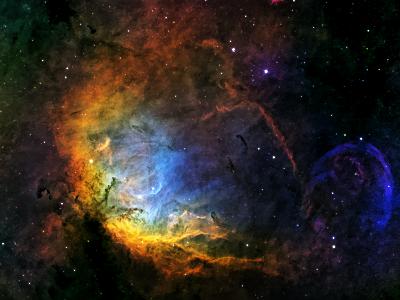
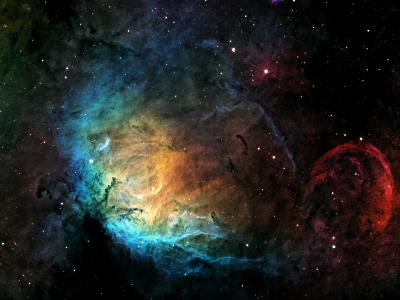
---
My Homepage
RSS news feed
Re: Submissions: 2021 July
Posted: Mon Jul 19, 2021 8:17 pm
by ExplorerEGYWO
My imaging for the NGC 7000 at Bortle 8 Sky in Cairo, EGYPT
Narrow Band imaging with more than 8 Hours integration time.
 NGC 7000
NGC 7000 by
Wael Omar, on Flickr
Re: Submissions: 2021 July
Posted: Tue Jul 20, 2021 8:58 am
by javierflores
The Eta Carinae nebula, classified as NGC 3372, covers three degrees in the sky, which at a distance of 8800 light years corresponds to a diameter of 460 light years. Two other nebulae have been added to it, but they are probably neighboring nebulae to Eta Carinae and not directly connected. The distances to them is not very certain but they are probably also the arm of Sagittarius.
Image taken from Chile

Re: Submissions: 2021 July
Posted: Tue Jul 20, 2021 11:30 am
by AlexanderCurry
 Polaris
Polaris by
Alexander Curry
Polaris captured using Telescope Live
@alex.astropics on Instagram
Re: Submissions: 2021 July
Posted: Tue Jul 20, 2021 2:49 pm
by the_astronomy_enthusiast
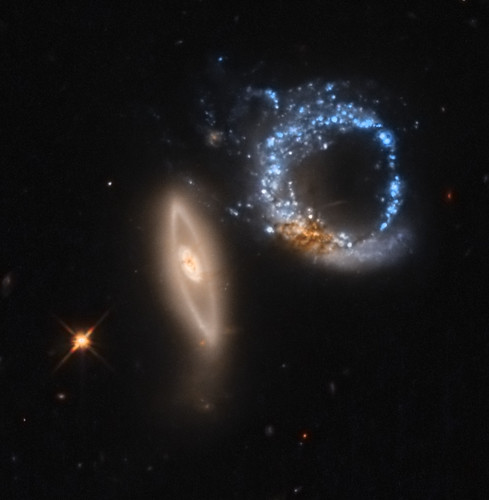 ARP 147 - Hubble scores a perfect 10!
ARP 147 - Hubble scores a perfect 10! by
William Ostling, on Flickr
To get this awesome image, Hubble aimed its prime working camera, the Wide Field Planetary Camera 2 (WFPC2), at a particularly intriguing target, a pair of gravitationally interacting galaxies called Arp 147.
The two galaxies happen to be oriented so that they appear to mark the number 10. The left-most galaxy, or the "one" in this image, is relatively undisturbed, apart from a smooth ring of starlight. It appears nearly edge-on to our line of sight. The right-most galaxy, the "zero" of the pair, exhibits a clumpy, blue ring of intense star formation.
Data was used from the following proposals:
https://archive.stsci.edu/proposal_sear ... t&id=11902
R: 814w
G: 555w
B: 450w
All processing was done in pixinsight.
Website:
https://theastroenthusiast.com/
Instagram:
https://www.instagram.com/the_astronomy_enthusiast/
Re: Submissions: 2021 July
Posted: Tue Jul 20, 2021 5:39 pm
by Guest
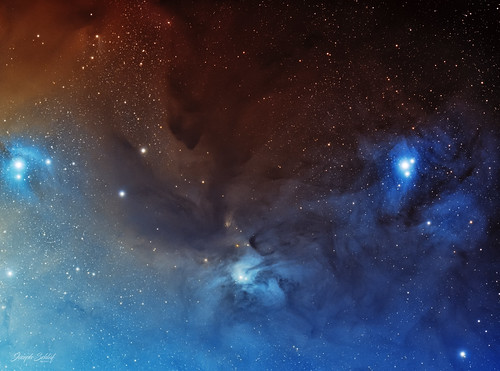 rho-ophiuchi-cloud-complex
rho-ophiuchi-cloud-complex by
Joe Schlaf, on Flickr
More commonly photographed in it's entirety or in combination with Milky Way and it's galactic core, this is a deeper dive into the Rho Ophiuchi cloud complex. Seen here are the blue reflection nebulae of IC 4603, IC 4604, and IC 4605. The cool blues are offset by the mingling of dust reflecting the brilliant orange light of Antares (out of frame to the left).
Stacked images taken over May/June 2021. Michigan.
Frames:
30x60" (30') (gain: 139.00) -20C
ZWO Blue 1.25": 30x60" (30') (gain: 139.00) -20C
ZWO Green 1.25": 20x60" (20') (gain: 139.00) -20C
ZWO Lum 1.25": 15x180" (45') (gain: 139.00) -20C
ZWO Lum 1.25": 452x60" (7h 32') (gain: 139.00) -20C
ZWO Red 1.25": 53x60" (53') (gain: 139.00) -20C
Integration: 10h 30'
Re: Submissions: 2021 July
Posted: Tue Jul 20, 2021 7:32 pm
by quorthon89
The Lagoon and Trifid Nebulae
https://flic.kr/p/2mbBH6x
M8 y M20 - JJMA ©2021
Copyright: Juan Jose Marquez
https://flic.kr/p/2mbBH6x
Messier 8 and Messier 20 objects, also known as the Lagoon and Trifid nebulae (left and right in the picture respectively) are located in constellation Sagittarius. Both are estimated to be between 4,000 - 6,000 light-years away from us and are classified as emission nebulae. Inside them takes place an active star formation feeded by those huge HII clouds.
Telescope: William Optics ZenithStar 73 with 0.8x reducer-flattener
Camera: ASI 183MC Pro with Optolong L-Enhance filter
Mount: Skywatcher EQ6-R Pro
Autoguiding scope and camera: QHY mini 130mm + ASI 120MC-S
Capture sequence with ZWO Asiair
92 x 180" lights (4hr 36min total integration) + 30 darks.
From Sierra Norte in Sevilla, Spain (bortle 4 skies).
Stacked in DSS, processed with Pixin LE and PS.
Re: Submissions: 2021 July
Posted: Tue Jul 20, 2021 8:18 pm
by quorthon89
Pelican Nebula (IC 5067)
https://flic.kr/p/2m41yUb
IC 5067 - JJMA ©2021
Copyright: Juan Jose Marquez
https://flic.kr/p/2m41yUb
IC 5067 object, also known as Pelican nebula, is located in constellation Cygnus. Is part of the same H-alpha emission region of the famous North-America nebula. Dark nodules or rather "Bok globules" can be easily observed. They are formed by molecular hydrogen and dust, being usually star formation areas. These Bok globules are just the ones that define the "eye" and the inner structure of the "beak" of this giant Pelican which spans 30 light-years and "flies" 1,800 light-years away from us.
Telescope: William Optics ZenithStar 73 with 0.8x reducer-flattener
Camera: ASI 183MC Pro with Optolong L-Enhance filter
Mount: Skywatcher EQ6-R Pro
Autoguiding scope and camera: QHY mini 130mm + ASI 120MC-S
Capture sequence with ZWO Asiair
50 x 360" lights (5hr total integration) + 20 darks.
From Sierra Norte in Sevilla, Spain (bortle 4 skies).
Stacked in DSS, processed with Pixin LE and PS.
Re: Submissions: 2021 July
Posted: Wed Jul 21, 2021 8:30 am
by rechejaro
For educational purposes, using a disk and a 500mm telephoto lens, with APSC sensor (real focal length 800mm) these simulations of an annular, partial and total eclipse were created.
https://www.flickr.com/photos/186202453 ... ool-apods/
Re: Submissions: 2021 July
Posted: Wed Jul 21, 2021 1:03 pm
by leonardodimaggio
The Milky Way shines brightly through a thin layer of high cloud making the brightest of the stars even more vibrant and magnificent.
The Three Sisters mountain range sits in the background of the image.
Taken in Canmore, Alberta, Canada on 05/06/2019. Panorama with Canon 5diii and Samyang 35mm f/1.4
Attached is a thumbnail, larger file available to view at:
www.leonardodimaggio.com/landscape
Instagram: @leonardodimaggio_
Re: Submissions: 2021 July
Posted: Wed Jul 21, 2021 3:01 pm
by the_astronomy_enthusiast
Arp-Madore 2026-424
 Arp-Madore 2026-424
Arp-Madore 2026-424 by
William Ostling, on Flickr
Data was taken by Hubble's Advanced Camera for Surveys (ACS)
In this Hubble Space Telescope image, an uncanny pair of glowing eyes glares menacingly in our direction. The piercing "eyes" are the most prominent feature of what resembles the face of an otherworldly creature.
But this is no ghostly apparition. Hubble is looking at a titanic head-on collision between two galaxies.
Each "eye" is the bright core of a galaxy, one of which slammed into another. The outline of the face is a ring of young blue stars. Other clumps of new stars form a nose and mouth. The entire system is catalogued as Arp-Madore 2026-424.
Data was used from the following proposals:
https://archive.stsci.edu/proposal_sear ... t&id=15756
https://archive.stsci.edu/proposal_sear ... t&id=15446
R: 814w
G: 814 + 606w
B: 606w
All processing was done in pixinsight
Website:
https://theastroenthusiast.com/
Instagram:
http://www.instagram.com/the_astronomy_enthusiast/
Re: Submissions: 2021 July
Posted: Thu Jul 22, 2021 12:05 am
by maxifalieres
Total Solar Eclipse
Location: Valcheta, Río Negro, Argentina - 14/12/2020
Telescope: Hokenn 150/750 - SW Eq5 mount
Camera: Nikon D80
Copyright: Maxi Falieres
https://flic.kr/p/2kjW1bH
https://flic.kr/p/2kjZKtm
Re: Submissions: 2021 July
Posted: Thu Jul 22, 2021 1:18 am
by TheMidnightSky
"Fire Moon"
https://www.rddnjk.com/
Copyright: Russell King. On the evening of July 20, 2021, I looked up and saw what appeared to be the Moon in Eclipse. I was use to see the Moon like this when rising, but it was very high in the sky and also was phased. I realized that the California Fires were creating the Eclipsed effect and being only 3 miles from the Ocean, the smoke was creating this beautiful Moon. It was very hard to focus properly because of the polluted atmosphere, but I did my best. Oh, did I mention that I was only 3 miles from the "Atlantic Ocean". Neptune, N.J.. 2000 miles away
Re: Submissions: 2021 July
Posted: Thu Jul 22, 2021 4:07 pm
by the_astronomy_enthusiast
NGC 4535 - The Lost Galaxy
 NGC 4535 - The Lost Galaxy
NGC 4535 - The Lost Galaxy by
William Ostling, on Flickr
Data was taken by Hubble's Wide Field Camera 3 (WFC3)
Located in the constellation of Virgo (The Virgin), around 50 million light-years from Earth, NGC 4535 is truly a stunning sight to behold. Despite the incredible quality of this image, taken from the NASA/ESA Hubble Space Telescope, NGC 4535 has a hazy, somewhat ghostly, appearance when viewed from a smaller telescope. This led amateur astronomer Leland S. Copeland to nickname NGC 4535 the “Lost Galaxy” in the 1950s.
The bright colours in this image aren’t just beautiful to look at, as they actually tell us about the population of stars within this barred spiral galaxy. The bright blue-ish colours, seen nestled amongst NGC 4535’s long, spiral arms, indicate the presence of a greater number of younger and hotter stars. In contrast, the yellower tones of this galaxy’s bulge suggest that this central area is home to stars which are older and cooler.
This galaxy was studied as part of the PHANGS survey, which aims to clarify many of the links between cold gas clouds, star formation, and the overall shape and other properties of galaxies. On 11 January 2021 the first release of the PHANGS-HST Collection was made publicly available.
Data was used from the following proposals:
https://archive.stsci.edu/hlsp/phangs-hst
R: 814w
G: 555w
B: 438w + 336w + 275w
All processing was done in pixinsight
Website:
https://theastroenthusiast.com/
Instagram:
http://www.instagram.com/the_astronomy_enthusiast/
Re: Submissions: 2021 July
Posted: Thu Jul 22, 2021 6:08 pm
by KuriousGeorge
Jewels in a Red Sea. KG Observatory, Julian CA.
Star Cluster IC1311 is located approximately 4,000 light years from Earth. The cluster is embedded in a giant emission nebula. The nebula is glowing from the ultraviolet light from hot, massive blue stars in the nebula.
https://www.astrobin.com/e2ymo0/
Re: Submissions: 2021 July
Posted: Thu Jul 22, 2021 9:04 pm
by AndreaFacco
Milky Way from Manarola, Italy

Shot taken on July 9, 2021 at about 10.30 pm
I made two photos: one for the environment with Fujifilm GFX-100s in HDR, and one photo for the sky with Nikon D800E with baader modification on the sensor and post-production in stacking of multiple photos
Re: Submissions: 2021 July
Posted: Sat Jul 24, 2021 7:58 am
by jeffbax
Hi,
this is an image of NGC 4565 - the Spindle Galaxy, in constellation coma Berenice.
Image taken with the 1 meter Newton f/3 of C2PU observatory - Cote d'Azur, France
Imager : SBIG STX 4000 36 x 36
4h30 luminance and 1h45 per RVB channel.
Copyrignt : David Vernet and JF BAX

Clear sky.
JF
Re: Submissions: 2021 July
Posted: Sat Jul 24, 2021 10:44 am
by Victor Lima
CATEGORY: STACKED
SOCIAL IG: @victorlimaphoto
STORY:
Star Trail over Salto Santa Maria, one of the main waterfalls of the Iguaçu Falls complex in Brazil.
Photographing Iguazu Falls at night has always been one of my priority projects. For that, it was necessary to obtain a special authorization from the environmental agency responsible for national parks in Brazil. Finally, in early 2021, I got this authorization and set out to put my plan into practice.
I spent 4 days inside the Iguaçu National Park with exclusive access at night to the Falls for me and my students. The first challenge is to walk around the park at night knowing that several jaguars reside there, which are frequently seen by employees and tourists. In the area closest to the main waterfalls, the big challenge is to make long exposure images with the strong water spray from the more than 1.5 million liters per second that fall through the waterfalls. Working with exposure times longer than 30 seconds became an almost impossible task and the lens was never dry.
To assemble the Star Trail, the Sequator software was used.
EXIF:
Canon R5 / Canon EF 16-35mm f/2.8L II USM
86x 16mm | f/2.8 | 30 sec | ISO 4000 (Sequator)
 Water Planet
Water Planet by
Victor Lima, no Flickr
Re: Submissions: 2021 July
Posted: Sat Jul 24, 2021 11:36 am
by Caroline Berger
VdB152
a reflection nebula in Cepheus
details and full on my astrobin
https://www.astrobin.com/dkshrv/0/
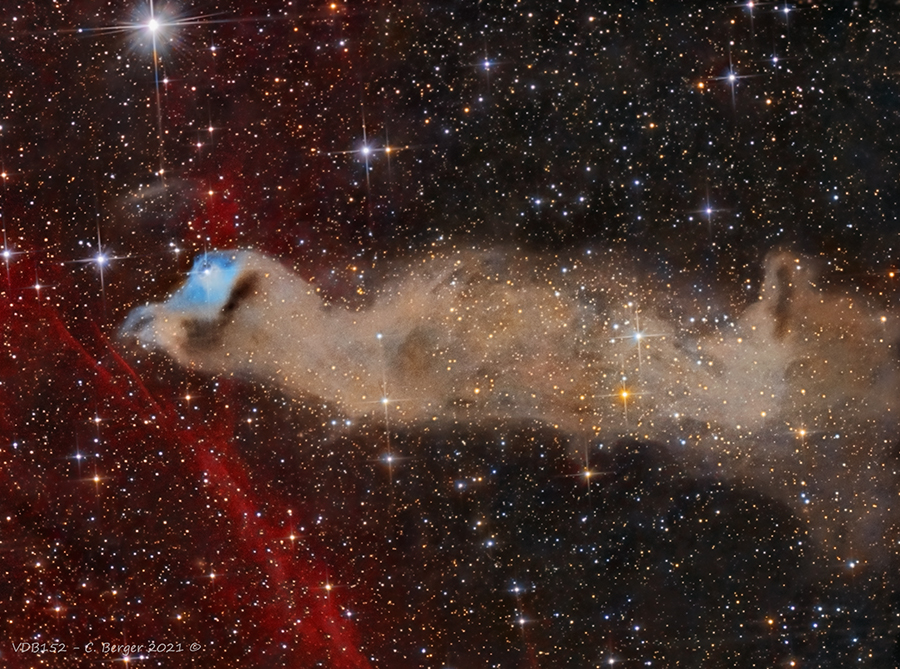
Re: Submissions: 2021 July
Posted: Sat Jul 24, 2021 11:44 am
by MrRat
North America and Pelican Nebulae
https://www.MrRat.com
Copyright: MrRat.com
Re: Submissions: 2021 July
Posted: Sat Jul 24, 2021 4:20 pm
by stefanz
NGC 2903 in H-alpha and continuum light
NGC 2903 is a barred spiral galaxy in constellation Leo.
The image is calculated with and without H-alpha information. By toggling between the two variants the correlation between HII gas clouds and bluish regions (containing young stars and probably also OIII gas) can be visualized.
Click on the animation for detailed information and full resolution pictures.
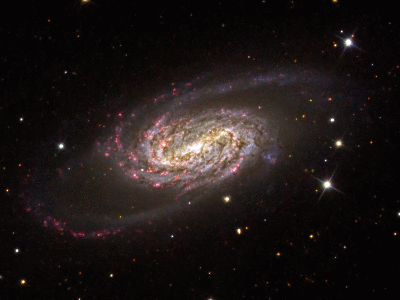
---
My Homepage
RSS news feed
Re: Submissions: 2021 July
Posted: Sun Jul 25, 2021 7:44 am
by prath83
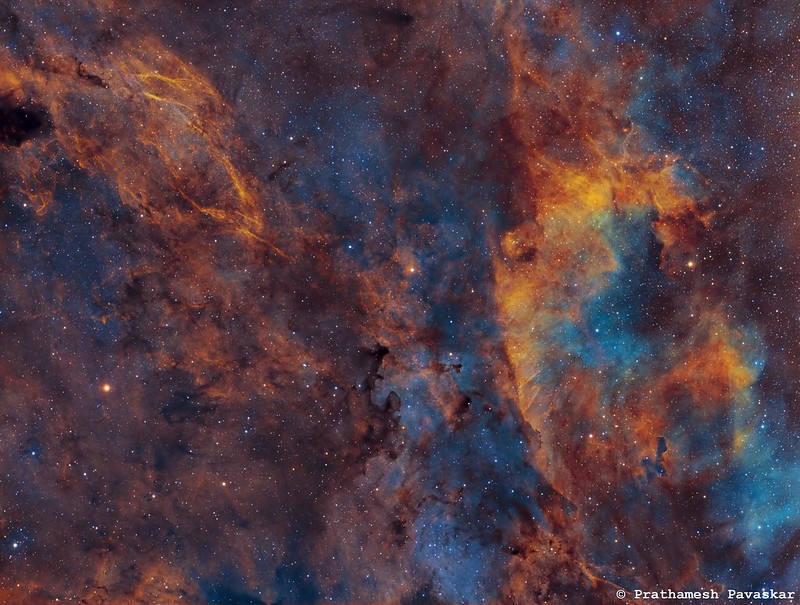 VdB130 region
VdB130 region by
Prathamesh Pavaskar, on Flickr
Dynamic SHO palette image of the nebulosity around VdB130
Equipment:
Telescope: Takahashi FSQ106EDXII
Mount: ASA DDM60 Pro
Camera: ZWO ASI1600MM Pro
Guiding: Unguided
Filters: Astrodon 5nm Ha, 3nm OIII, 3nm SII
Acquisition:
• 75 X 300s Ha at Gain 200 Offset 50
• 125 X 300s OIII at Gain 200 Offset 50
• 125 X 300s SII at Gain 200 Offset 50
Re: Submissions: 2021 July
Posted: Sun Jul 25, 2021 7:52 am
by Tom Glenn
Full "Buck" Moon of July, with Clouds
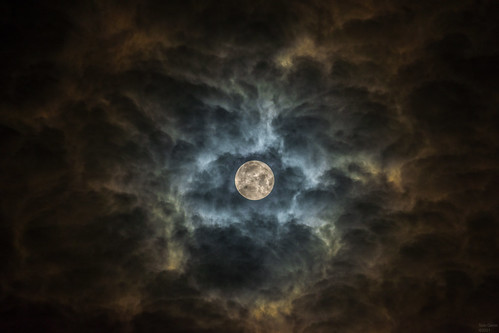 Full Buck Moon with Clouds
Full Buck Moon with Clouds by
Tom Glenn, on Flickr
The Full "Buck" Moon of July appears in this single exposure photograph, shining through cloud cover in San Diego, CA, as observed in the early morning hours of Saturday, July 24, 2021, at 02:29 PDT.
Full sized image:
https://live.staticflickr.com/65535/513 ... 310f_o.jpg
I wasn't originally planning any photography on this night, but I looked out the window and noticed an amazing collection of clouds covering the Full Moon, so I raced outside to quickly capture this photograph. Normally, the full Moon is so bright that one cannot simultaneously expose for the Moon and foreground elements at night. However, in this case the clouds reduced the brightness of the Moon just enough to allow a single exposure to capture the Moon, as well as the clouds that it was illuminating. The resulting colors are no doubt an interesting mix of moonlight, a thick atmosphere (low elevation), and light pollution. Image captured in one exposure of 1/25s taken with a Nikon D5600 and 70-200mm lens at 200mm, f/2.8, ISO 100.



 ARP 147 - Hubble scores a perfect 10! by William Ostling, on Flickr
ARP 147 - Hubble scores a perfect 10! by William Ostling, on Flickr rho-ophiuchi-cloud-complex by Joe Schlaf, on Flickr
rho-ophiuchi-cloud-complex by Joe Schlaf, on Flickr Arp-Madore 2026-424 by William Ostling, on Flickr
Arp-Madore 2026-424 by William Ostling, on Flickr NGC 4535 - The Lost Galaxy by William Ostling, on Flickr
NGC 4535 - The Lost Galaxy by William Ostling, on Flickr Water Planet by Victor Lima, no Flickr
Water Planet by Victor Lima, no Flickr

 VdB130 region by Prathamesh Pavaskar, on Flickr
VdB130 region by Prathamesh Pavaskar, on Flickr Full Buck Moon with Clouds by Tom Glenn, on Flickr
Full Buck Moon with Clouds by Tom Glenn, on Flickr